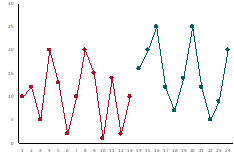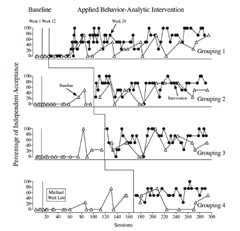What is one unit of measurement on the weekly nutrition spreadsheet?
Grams, cals per gram, food or drink item, ounces
Score when the entire bite or drink enters the mouth after 5 s of the spoon or cup first coming within child’s reach.
NONactive acceptance
The frequency of and degree to which multiple measures of behavior result in different outcomes
Stability
What is one type of disordered feeding pattern seen in children with feeding difficulties?
Could be: insensitive to social cues; eating disrupted from a change in environment; will not eat non-preferred food even when hungry; reaction to non-preferred food is excessive; variety does not provide adequate nutrition; drop in weight over time; growth failure
Name at least two members of the interdisciplinary team
GI/medical, nutritionist/dietician, SLP/OT, behavior analyst/Psych
What are the steps you take to measure food or liquid intake during a feeding session?
Weigh the foods or liquids before the session, weigh the foods or liquids after the session, subtract spill (expel), track emesis
Score when food or liquid exits the mouth, not due to swallowing
Expel
Overall direction of the datapath. Could be increasing or decreasing.
Trend
What does ARFID stand for?
Avoidant restriction food intake disorder
What is the role of the swallow expert during the intake evaluation?
Assess oral-motor status, ensure the child is a safe oral feeder, refer for additional testing (swallow study)
Who do you send the weekly nutritional spreadsheet to for analysis?
The dietician
Is gagging part of the operational definition for inappropriate mealtime behavior?
No
How would you describe the datapaths depicted in this picture?

Variable
What is a transient feeding difficulty in children?
Errors that resolve with practice, peers influence preference, will eat when hungry, variety will emerge with exposure
Name one type of record or piece of information we might request as part of the intake process for admission of a child into a pediatric feeding disorders program
Medical records, growth charts, history of therapeutic services, food log
The term “emesis” is another word for:
Vomit
Where would you find the dependent variable on a graph?
Y-axis
The variable we measure and whose change depends on changes in the independent variable
Dependent Measure
Medical complexities, oral-motor skill deficits, environmental events
Things that likely contribute to the development and maintenance of a feeding disorder
A high number of children with feeding disorders will also have some type of what, that could also contribute to the feeding disorder?
Medical condition
What website could you use to determine an approximation of your daily caloric intake or to determine the estimated energy requirements for a child based on age?
The CDC website
Monitor child progress, establish control, make treatment decisions
The main reasons we use graphs
The following picture is an example of what type of experimental design?
Multibaseline
What are some of the negative consequences associated with pediatric feeding disorders?
- Malnutrition
- Weight loss
- Dehydration
- Children who eat mostly junk foods are at greater risk for acquiring obesity or Type II diabetes
- Failure to advance to age-typical eating
- Unable to participate in social events that revolve around food
What is the role of the behavior analyst during the intake evaluation process?
Assess environmental variables that could maintain feeding difficulties (HMBL, SOBL, caregiver interview)